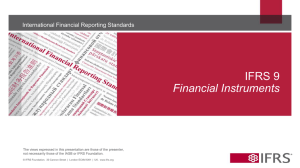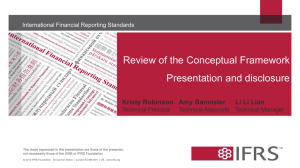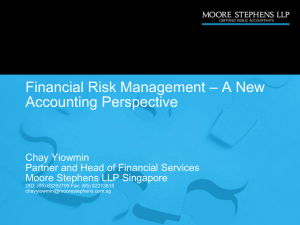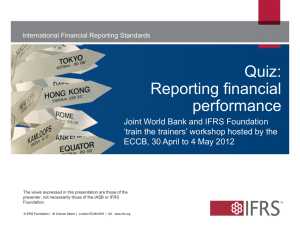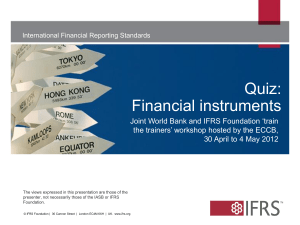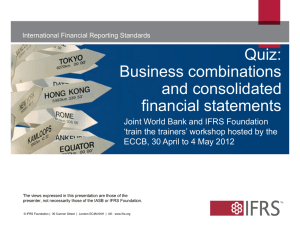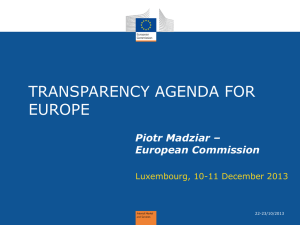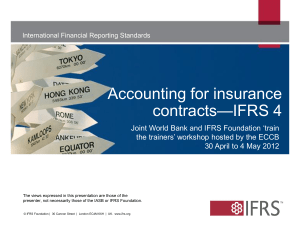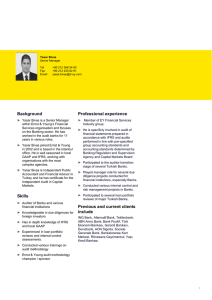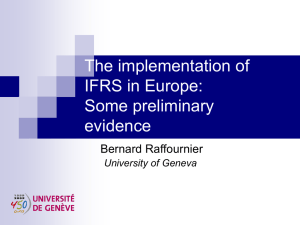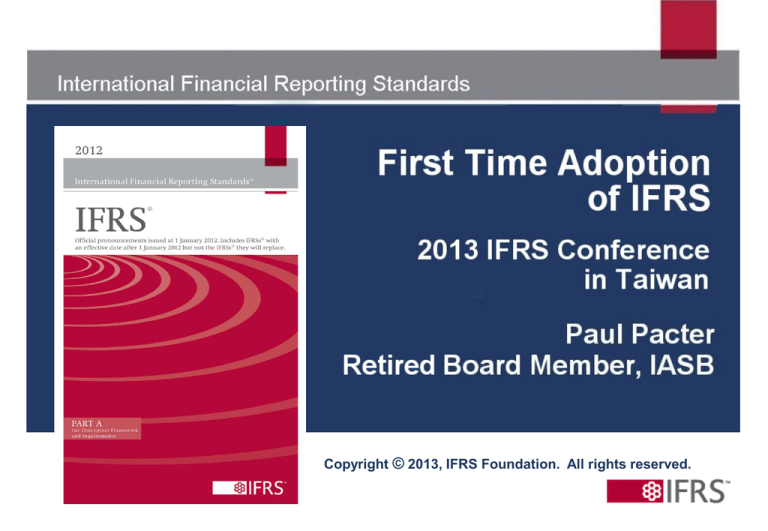
Copyright © 2013, IFRS Foundation. All rights reserved.
2
Use of International Financial
Reporting Standards Around the
World
Copyright © 2013 IFRS Foundation | 30 Cannon Street | London EC4M 6XH UK | www.ifrs.org
Why global GAAP for listed companies
3
• Historically accounting standards
evolved country by country
– Set by government, or accounting profession, or
independent board
• National standards made sense when
companies raised money in, and investors
sought investment opportunities in, only
their home country.
• Big change 1975-2010:
– Globalisation of capital markets
© 2013 IFRS Foundation. 30 Cannon Street | London EC4M 6XH | UK. www.ifrs.org
Why global GAAP for listed companies
4
• Now, investors seek investment
opportunities all over the world
• Companies seek capital at the lowest
price anywhere
• Cross-border mergers
Accounting differences reduce
understandability and obscure
comparisons that investors want to make
© 2013 IFRS Foundation. 30 Cannon Street | London EC4M 6XH | UK. www.ifrs.org
Why global GAAP for listed companies
• High quality global financial reporting
standards – carefully applied – benefit
investors, lenders, other capital
providers:
– Information is understandable
– Domestically and across borders
– Comparability is enhanced
– Capital providers have confidence
Copyright © 2013 IFRS Foundation | 30 Cannon Street | London EC4M 6XH UK | www.ifrs.org
5
Why global GAAP for listed companies
• High quality global standards also
benefit companies that seek capital:
– Reduce compliance costs
– Remove uncertainties that affect their
cost of capital
• Improve consistency in audit quality
• Facilitate education and training
Copyright © 2013 IFRS Foundation | 30 Cannon Street | London EC4M 6XH UK | www.ifrs.org
6
Use of IFRS around the world today
For domestic listed
companies:
IFRSs required for all
IFRSs required for some
IFRSs permitted
Not permitted
7
Number of
Jurisdictions
93
7
25
28
Today, full IFRS are used by listed
companies in 123 jurisdictions
http://www.iasplus.com/Plone/en/resources/use-of-ifrs
© 2013 IFRS Foundation. 30 Cannon Street | London EC4M 6XH | UK. www.ifrs.org
Use of IFRS around the world today
For domestic unlisted
companies:
IFRSs required for all
IFRSs required for some
IFRSs permitted
Not permitted
8
Number of
Jurisdictions
27
33
42
35
Today, full IFRS are used by unlisted
companies in 102 jurisdictions.
http://www.iasplus.com/Plone/en/resources/use-of-ifrs
© 2013 IFRS Foundation. 30 Cannon Street | London EC4M 6XH | UK. www.ifrs.org
Fortune Global 500 (July 2011)
Which GAAP?
IFRS and wordfor-word
equivalents
US GAAP
National GAAP
Totals
9
Based on
announced plans
2011 2013 If Japan 2016
42% 44% 58%
31% 31% 27%
27% 25% 15%
100% 100% 100%
Copyright © 2013 IFRS Foundation | 30 Cannon Street | London EC4M 6XH UK | www.ifrs.org
Fortune Global 500 (July 2011)
10
Increases from 2011 to 2013 (listed companies):
Switch to IFRSs
Malaysia
Mexico
Singapore
Taiwan
2012
2012
2012 (nearly IFRS now)
2013
No. G500 co’s
1
3*
2
8
*1 of Mexico’s 3 Global 500 companies is already
using IFRSs in 2011
Copyright © 2013 IFRS Foundation | 30 Cannon Street | London EC4M 6XH UK | www.ifrs.org
Fortune Global 500 (July 2011)
11
After 2013, remaining non-IFRS (listed companies):
China
Colombia
India
Japan
Comments
Adopted main IFRS principles
IFRS planned 2015
Proposed many modifications
to IFRS
Seriously considering: 2016?
Russia
IFRS adoption approved
Saudi Arabia IFRS under discussion
Thailand
USA
Decision deferred
Copyright © 2013 IFRS Foundation | 30 Cannon Street | London EC4M 6XH UK | www.ifrs.org
No. G500 co’s
61
1
8
68 (51 J-GAAP
& 17 US GAAP)
7
1
1
133
IASB history
12
• 1973-2000:
–International Accounting Standards
Committee (IASC)
–Set up by 9 countries because of
globalisation of capital markets
–IASs 1 to 41
–By 2000 only some voluntary adoptions
by listed companies, very few unlisted
companies
12
Copyright © 2013 IFRS Foundation | 30 Cannon Street | London EC4M 6XH UK | www.ifrs.org
IASB history
13
• Since 2001:
–IASC reorganised into International
Accounting Standards Board (IASB)
–IFRSs 1-13 and improved IASs 1-41
–Adoptions for listed companies by around
100 countries
–Europe was the catalyst – adopted IFRS
for listed companies starting 2005
–Dozens of other countries followed
Copyright © 2013 IFRS Foundation | 30 Cannon Street | London EC4M 6XH UK | www.ifrs.org
14
First-Time Adoption of IFRSs as
Your National Standards
(focus on full IFRSs)
Copyright © 2013 IFRS Foundation | 30 Cannon Street | London EC4M 6XH UK | www.ifrs.org
Definition of First-time Adoption (FTA)
•
15
First set of financial statements in which
the entity makes an “explicit and
unreserved statement of compliance with
IFRSs”:
“…in conformity with International Financial
Reporting Standards…”
Copyright © 2013 IFRS Foundation | 30 Cannon Street | London EC4M 6XH UK | www.ifrs.org
Two Key Steps
16
• Select accounting policies based on IFRSs
in force at end of reporting period of FTA:
– Assume 31 December 2013 for this
presentation
• Prepare at least two years financial
statements, and opening balance sheet for
the earliest year, using those policies
– This would mean financial statements for
2013 and 2012 and an opening balance
sheet at 1 January 2012
Copyright © 2013 IFRS Foundation | 30 Cannon Street | London EC4M 6XH UK | www.ifrs.org
Selecting Initial IFRS Accounting Policies
17
• Criteria for selecting accounting policies:
– Relevance
– Reliability
• Many accounting policy decisions depend
on circumstances – not “free choice”
• But some are pure “free choice”
Copyright © 2013 IFRS Foundation | 30 Cannon Street | London EC4M 6XH UK | www.ifrs.org
Selecting Initial IFRS Accounting Policies
18
• A few examples of decisions that depend
on circumstances:
– % of completion versus completed contract
– Method of depreciation
– Specific identification or FIFO for
inventories
– Whether to adjust the financial statements
for events occurring after end of period
– Functional currency for translation
Copyright © 2013 IFRS Foundation | 30 Cannon Street | London EC4M 6XH UK | www.ifrs.org
Selecting Initial IFRS Accounting Policies
19
• On the other hand, IFRSs allow quite a
few accounting policy choices that do not
depend on circumstances:
– First-time adopters must choose
– Examples on next ten slides
Copyright © 2013 IFRS Foundation | 30 Cannon Street | London EC4M 6XH UK | www.ifrs.org
Accounting Policy Options in IFRSs
20
• IFRS 1 – Options for whether to restate prior
periods for some types of transactions at time
of FTA:
– I will cover these in detail later this
morning
• IFRS 3 – In an acquisition of less than 100%,
measure 100% of goodwill or only parent’s
share of goodwill
Copyright © 2013 IFRS Foundation | 30 Cannon Street | London EC4M 6XH UK | www.ifrs.org
Accounting Policy Options in IFRSs
21
• IFRS 4 – Option to re-measure insurance
liabilities to fair value each period
• IFRS 6 – Oil & gas or mining company may
revalue exploration and evaluation assets
through OCI
• IFRS 9 – Option to designate financial assets
individually at fair value through profit or loss
Copyright © 2013 IFRS Foundation | 30 Cannon Street | London EC4M 6XH UK | www.ifrs.org
Accounting Policy Options in IFRSs
22
• IFRS 9 – Option to designate financial liabilities
individually at fair value through profit or loss
• IFRS 9 – Option not to separate embedded
derivatives in a host contract that is not a
financial instrument and, instead, measure
whole contract at fair value through P&L
• IFRS 9 – Option to use hedge accounting
Copyright © 2013 IFRS Foundation | 30 Cannon Street | London EC4M 6XH UK | www.ifrs.org
Accounting Policy Options in IFRSs
23
• IFRS 9 – Option to designate financial liabilities
individually at fair value through profit or loss
• IFRS 9 – Option to designate equity
investments as fair value through P&L or fair
value through OCI (no recycling)
• IFRS 10 – Option not to present consolidated
financial statements in limited circumstances
Copyright © 2013 IFRS Foundation | 30 Cannon Street | London EC4M 6XH UK | www.ifrs.org
Accounting Policy Options in IFRSs
24
• IAS 1 – Present expenses in income statement
by nature or by function
• IAS 1 – One statement of comprehensive
income or separate income statement and
comprehensive income statement
Copyright © 2013 IFRS Foundation | 30 Cannon Street | London EC4M 6XH UK | www.ifrs.org
Accounting Policy Options in IFRSs
25
• IAS 2 – Option to measure inventories such as
agricultural produce, minerals, and
commodities at net realisable value rather than
cost
• IAS 2 – Inventories at FIFO or weighted
average (but LIFO is prohibited)
Copyright © 2013 IFRS Foundation | 30 Cannon Street | London EC4M 6XH UK | www.ifrs.org
Accounting Policy Options in IFRSs
26
• IAS 7 – Direct or indirect method for presenting
operating cash flows
• IAS 7 – Option to classify interest and dividends
as operating, investing, or financing
• IAS 16 – Measure PP&E using costdepreciation model or revaluation through OCI
model
Copyright © 2013 IFRS Foundation | 30 Cannon Street | London EC4M 6XH UK | www.ifrs.org
Accounting Policy Options in IFRSs
27
• IAS 20 – Many options for government grants
• IAS 27 – In separate financial statements,
choose cost or fair value for investments in
subsidiaries, associates, joint ventures
• IAS 28 – In certain cases, option to measure
investments in associates and joint ventures at
FVTPL rather than equity method
Copyright © 2013 IFRS Foundation | 30 Cannon Street | London EC4M 6XH UK | www.ifrs.org
Accounting Policy Options in IFRSs
28
• IAS 38 – Cost-depreciation model or
revaluation through equity model for intangible
assets with quoted market prices
• IAS 39 – Hedge accounting is optional
• IAS 39 – Designate individual financial assets
and financial liabilities to be measured at fair
value through profit or loss (fair value option)
Copyright © 2013 IFRS Foundation | 30 Cannon Street | London EC4M 6XH UK | www.ifrs.org
Accounting Policy Options in IFRSs
29
• IAS 39 – Option to designate equity
investments as fair value through P&L or fair
value through OCI
• IAS 39 – Option not to separate an embedded
derivative and, instead, account for the entire
contract at fair value through P&L
• IAS 39 – Choice of trade date or settlement
date accounting
Copyright © 2013 IFRS Foundation | 30 Cannon Street | London EC4M 6XH UK | www.ifrs.org
Accounting Policy Options in IFRSs
30
• IAS 39 – Choose whether to adjust the
carrying amount of a hedged item for gains or
losses on the hedging instrument
• IAS 39 – Option to reclassify out of fair value
through P&L and out of available for sale
• If adopting in 2013, do you want to earlyapply IFRS 9 (which is effective 2015) or
start with IAS 39?
Copyright © 2013 IFRS Foundation | 30 Cannon Street | London EC4M 6XH UK | www.ifrs.org
Accounting Policy Options in IFRSs
31
• IAS 40 – For investment property, choose the
cost-depreciation model or fair value through
profit or loss model
• IAS 40 – Whether to treat land use rights as
investment property
• Early application – Some new or amended
standards effective after the end of 2013
permit early application
Copyright © 2013 IFRS Foundation | 30 Cannon Street | London EC4M 6XH UK | www.ifrs.org
Adjustments Required to Move to IFRSs
• Five kinds of adjustments from national
GAAP to IFRSs:
1. Derecognise some old assets and
liabilities
2. Recognise some new assets and
liabilities
3. Reclassifications
4. Measurement changes
5. New disclosures
Copyright © 2013 IFRS Foundation | 30 Cannon Street | London EC4M 6XH UK | www.ifrs.org
32
Adjustments Required to Move to IFRSs
33
1. Derecognise some old assets and
liabilities. Examples:
– No capitalised research, training, preoperating, or advertising costs
– No accrued liabilities for general reserves,
future losses, and most restructurings
Copyright © 2013 IFRS Foundation | 30 Cannon Street | London EC4M 6XH UK | www.ifrs.org
Adjustments Required to Move to IFRSs
2. Recognise some new assets and
liabilities. Examples:
– Derivatives and embedded derivatives
– Obligations for defined benefit pension,
retiree medical and life insurance,
termination benefits, accrued vacation
continued…
Copyright © 2013 IFRS Foundation | 30 Cannon Street | London EC4M 6XH UK | www.ifrs.org
34
Adjustments Required to Move to IFRSs
35
2. Recognise some new assets and liabilities
(more examples):
– Deferred tax assets and liabilities
– Provisions (liabilities) for onerous contracts,
litigation, decommissioning, environmental,
warranties
– Capitalise development costs
– Capitalise borrowing costs during
construction
Copyright © 2013 IFRS Foundation | 30 Cannon Street | London EC4M 6XH UK | www.ifrs.org
Adjustments Required to Move to IFRSs
36
3. Reclassifications. Examples:
– Dividends declared after balance sheet
date are not liabilities
– Treasury stock is not an asset
– Split land and buildings acquired jointly
– Liability versus equity:
– Mandatorily redeemable preferred shares
and puttables are a liability
– Minority interest is in equity
continued…
Copyright © 2013 IFRS Foundation | 30 Cannon Street | London EC4M 6XH UK | www.ifrs.org
Adjustments Required to Move to IFRSs
37
3. Reclassifications. More examples:
– Equity component of convertible debt, if
still outstanding at FTA date
– Defining reportable segments under
IFRS 8
– Scope of consolidation
– Some offsetting
– Assets held for sale
– Discontinued operations
Copyright © 2013 IFRS Foundation | 30 Cannon Street | London EC4M 6XH UK | www.ifrs.org
Adjustments Required to Move to IFRSs
38
4. Measurement changes:
– Measurement principles in IFRSs at 31
Dec 2013 must be applied to measure all
recognised assets and liabilities at date of
FTA
– More fair value measurements
– More present value
Copyright © 2013 IFRS Foundation | 30 Cannon Street | London EC4M 6XH UK | www.ifrs.org
Adjustments Required to Move to IFRSs
39
4. Potential measurement changes:
– Share-based payments
– Noncontrolling interest in bus. comb.
– LIFO prohibited under IFRSs
– Reversals of writedowns under IFRSs
– IFRSs allow revaluation of PP&E
– Agricultural assets at FV thru P&L
– Immediately recognise past service cost
Copyright © 2013 IFRS Foundation | 30 Cannon Street | London EC4M 6XH UK | www.ifrs.org
Adjustments Required to Move to IFRSs
40
4. Potential measurement changes:
– Immediately recognise actuarial gains and
losses
– Definition of borrowing costs
– Must conform subs’ accounting policies
– No proportionate consolidation for joint
ventures
– Expected value for provisions
Copyright © 2013 IFRS Foundation | 30 Cannon Street | London EC4M 6XH UK | www.ifrs.org
Adjustments Required to Move to IFRSs
41
4. Potential measurement changes:
– Fair value options for FI
– Hedge accounting measurements (eg IFRS
has no ‘shortcut method’ as in US GAAP)
– Investment property at FV thru P&L
– Precise definition of fair value under IFRS
13
Copyright © 2013 IFRS Foundation | 30 Cannon Street | London EC4M 6XH UK | www.ifrs.org
Adjustments Required to Move to IFRSs
5. New disclosures ─ examples of IFRS
requirements:
– Specific line items on the face of the
financial statements
– One-year comparative information
– Comprehensive financial instrument
disclosures
– Segment liabilities
– Information about major customers
– Related party disclosures
Copyright © 2013 IFRS Foundation | 30 Cannon Street | London EC4M 6XH UK | www.ifrs.org
42
Adjustments Required to Move to IFRSs
43
• Adjustments to move from previous
GAAP to IFRSs at FTA:
– Should generally be recognised directly in
retained earnings at the date of the
opening IFRS balance sheet
– Or, if appropriate, recognise in another
category of equity
Copyright © 2013 IFRS Foundation | 30 Cannon Street | London EC4M 6XH UK | www.ifrs.org
Exceptions to Restatement
44
• There are some exceptions to the
requirement to restate comparative data
using IFRSs at 31 Dec 2013:
– Some exceptions are optional
– Some exceptions are mandatory
Copyright © 2013 IFRS Foundation | 30 Cannon Street | London EC4M 6XH UK | www.ifrs.org
Optional Exceptions
• Business Combinations:
– May keep old GAAP. Need not restate:
– Initial measurement of goodwill
– Goodwill written off against equity
– Carrying amounts of acquired assets
and liabilities
– However, entity may elect to restate old
business combinations
– Must test goodwill for impairment at
opening balance sheet date
Copyright © 2013 IFRS Foundation | 30 Cannon Street | London EC4M 6XH UK | www.ifrs.org
45
Optional Exceptions
46
• Property, plant and equipment (3 choices):
– May measure at FV at 1/1/2012. This
becomes ‘deemed cost’ going forward
– Also, revaluations under old GAAP can be
deemed cost at 1/1/2012
– Or may go back and apply costdepreciation-impairment model of IAS 16
in full
Copyright © 2013 IFRS Foundation | 30 Cannon Street | London EC4M 6XH UK | www.ifrs.org
Optional Exceptions
47
• Cumulative foreign currency translation
adjustments:
– Any amount deferred in equity under old
GAAP can be eliminated (adjust retained
earnings) at 1 Jan 2012
– If eliminated, gain or loss on future
disposal of the foreign operation reflects
only translation adjustments arising after 1
Jan 2012
Copyright © 2013 IFRS Foundation | 30 Cannon Street | London EC4M 6XH UK | www.ifrs.org
Optional Exceptions
48
• ‘Split accounting’ for convertible debt
redeemed before 1 Jan 2012
• Entity may designate financial instrument
as available-for-sale or fair-value-option at
1 Jan 2012
– IFRS 9/IAS 39 allow designation only on
date instrument is acquired
• Need not apply IFRS 2 to share-based
payments issued before 1 Jan 2012
Copyright © 2013 IFRS Foundation | 30 Cannon Street | London EC4M 6XH UK | www.ifrs.org
Optional Exceptions
49
• Full-cost oil and gas assets
– Retrospective application of IFRSs for oil
and gas assets is not required. Carrying
amount under old GAAP = deemed cost
• Determining whether an arrangement
contains a lease (IFRIC 4)
– Determination under old GAAP need not
change even if at a date different from what
IFRIC 4 would require
Copyright © 2013 IFRS Foundation | 30 Cannon Street | London EC4M 6XH UK | www.ifrs.org
Optional Exceptions
• In general IAS 1 requires comparative
information for all amounts in financial
statements and in the notes
– Exemptions for some comparative
information for financial instruments
(including IFRS 7), insurance contracts,
extractive industries, and historical
summaries
Copyright © 2013 IFRS Foundation | 30 Cannon Street | London EC4M 6XH UK | www.ifrs.org
50
Mandatory Exceptions
51
• Derecognition of financial assets and
liabilities:
– Do not “undo” past derecognitions based on
new information.
• Hedge accounting
– No new designation of hedge accounting for
hedges prior to 1 Jan 2012 if not treated as
hedges under old GAAP
• Estimates
– Do not change previous estimates unless
there was an error
Copyright © 2013 IFRS Foundation | 30 Cannon Street | London EC4M 6XH UK | www.ifrs.org
Disclosure
• Reconciliation
– Of equity and profit or loss under old
GAAP to IFRSs
• Newly recognised impairment losses
• Material adjustments from old cash flow
statement to IAS 7 cash flow statement
Copyright © 2013 IFRS Foundation | 30 Cannon Street | London EC4M 6XH UK | www.ifrs.org
52
53
First-time adoption
of the IFRS for Small
and Medium-sized
Entities
Copyright © 2013 IFRS Foundation | 30 Cannon Street | London EC4M 6XH UK | www.ifrs.org
The Final IFRS for SMEs
54
Good Financial Reporting Made Simple.
• About 230 pages
– Compared to 3,636 pages for full IFRSs
• Simplified IFRSs, but built on an IFRS
foundation
• Tailored for SMEs and needs of users of
their financial statements
• Issued 9 July 2009
• Already adopted by over 80 jurisdictions
Copyright © 2013 IFRS Foundation | 30 Cannon Street | London EC4M 6XH UK | www.ifrs.org
Who are we aiming at?
55
Non-publicly accountable entities that must
produce general purpose financial
statements (GPFS)
– Not publicly traded
– Not a bank or other financial institution
Which entities must produce GPFS is a
public interest issue
– Decided by legislature and regulators, not
by IASB
Copyright © 2013 IFRS Foundation | 30 Cannon Street | London EC4M 6XH UK | www.ifrs.org
How did we simplify?
56
1. Some topics in IFRSs omitted if irrelevant to
private entities
2. Where IFRSs have options, include only
simpler option
3. Recognition and measurement
simplifications
4. Reduced disclosures
5. Simplified drafting
Copyright © 2013 IFRS Foundation | 30 Cannon Street | London EC4M 6XH UK | www.ifrs.org
What would first-time adoption involve?
57
• First assertion of compliance with IFRS
for SMEs
• Can be switching from:
– National GAAP
– Full IFRSs
– Or maybe never published GPFS in the
past
• Date of transition is beginning of earliest
period presented
Copyright © 2013 IFRS Foundation | 30 Cannon Street | London EC4M 6XH UK | www.ifrs.org
What would first-time adoption involve?
58
• As with first-time adoption of full IFRSs,
FTA of IFRS for SMEs potentially involves
adjustments from national GAAP or full
IFRSs to IFRS for SMEs:
1. Derecognise some old assets and liabilities
2. Recognise some new assets and liabilities
3. Reclassifications
4. Measurement changes
Copyright © 2013 IFRS Foundation | 30 Cannon Street | London EC4M 6XH UK | www.ifrs.org
What would first-time adoption involve?
59
• Select accounting policies based on
choices in IFRS for SMEs (next 3 slides)
• Prepare at least two years financial
statements, and opening balance sheet
for the earliest year, using those policies
• Important simplification for SMEs:
– If it is impracticable to restate one or
more items, IFRS for SMEs allows an
exception, with disclosure of the resulting
non-comparabilities
Copyright © 2013 IFRS Foundation | 30 Cannon Street | London EC4M 6XH UK | www.ifrs.org
What would first-time adoption involve?
60
• Accounting policy choices permitted in
the IFRS for SMEs (page 1 of 3):
– Single statement of comprehensive
income or separate income statement
and statement of comprehensive income
– Combined statement of income and
retained earnings allowed in some
circumstances
Copyright © 2013 IFRS Foundation | 30 Cannon Street | London EC4M 6XH UK | www.ifrs.org
What would first-time adoption involve?
61
• Accounting policy choices permitted in
the IFRS for SMEs (page 2 of 3):
– Direct or indirect method for operating
cash flows
– Investments in associates and JVs at
cost, equity method, or FV thru P&L
– All actuarial gains/losses reported as part
of P&L or as Other Comprehensive
Income (but no deferrals allowed)
Copyright © 2013 IFRS Foundation | 30 Cannon Street | London EC4M 6XH UK | www.ifrs.org
What would first-time adoption involve?
62
• Accounting policy choices permitted in
the IFRS for SMEs (page 3 of 3):
– In separate company financial
statements, account for investment in
subsidiary at cost or at fair value through
P&L
• This list of choices is small compared
with full IFRSs and US GAAP
Copyright © 2013 IFRS Foundation | 30 Cannon Street | London EC4M 6XH UK | www.ifrs.org
What would first-time adoption involve?
63
• Examples of choices in full IFRSs not
available in IFRS for SMEs:
– Revalue PP&E and intangibles
– Investment property at cost or FVTPL
– Government grants – range of methods
– Financial instruments: fair value option,
available-for-sale option, held-to-maturity,
OCI option for equity, macro hedging
Copyright © 2013 IFRS Foundation | 30 Cannon Street | London EC4M 6XH UK | www.ifrs.org
What would the impact be?
64
• What’s the expected impact on income and
equity if SME switches to IFRS for SMEs?
– Depends on what its existing GAAP is
– Is it now close to IFRSs? Miles away?
– Are things like deferred taxes, pensions,
provisions, impairments accrued?
– Capital leases? Derivatives?
– Consolidation? Cash flow statement?
– And quality of implementation.
– Depends on which options it chooses
Copyright © 2013 IFRS Foundation | 30 Cannon Street | London EC4M 6XH UK | www.ifrs.org
We congratulate Taiwan
65
• ARDF has taken the bold step to adopt
IFRSs for listed companies, financial
institutions, and others 2013-2015
– Benefits of global comparability
• We hope that, at some appropriate time in
the future, you will also give consideration
to the IFRS for SMEs and our forthcoming
Guide for Micro Entities
– We are confident that there will be benefits
for Taiwan’s SMEs and Taiwan’s economy.
Copyright © 2013 IFRS Foundation | 30 Cannon Street | London EC4M 6XH UK | www.ifrs.org
Thank you
Panel and Q&A 10:50 to 11:50
Expressions of individual views by
members of the IASB and its staff are
encouraged.
The views expressed in this
presentation are those of the presenter.
Official positions of the IASB on
accounting matters are determined only
after extensive due process and
deliberation.
Copyright © 2013 IFRS Foundation | 30 Cannon Street | London EC4M 6XH UK | www.ifrs.org
66

